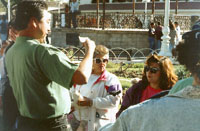Not long after her husband died, our friend Lila decided to leave Mexico and return to the USA. She chose Florida over her native New York. As a newly single senior, it seemed like a good place for her to pursue new horizons.
At first everything seemed great. Although she deeply missed her beloved husband of over 40 years, Lila relished the return to things All-American: the order, the efficiency, the punctuality. She rediscovered the joys of smooth tarmac and legible road signs gracing broad highways. She delighted in the gargantuan shopping malls crammed with to-die-for merchandise. And everywhere she went people spoke and understood English.
Yet gradually she sensed a nagging, undefined void in this new life. One day while waiting in the express line at her local supermarket it came clear to her. She noticed the cashier look her way, nudge a coworker and say, sotto voce, “That’s the one I was telling you about, that’s the lady who says ‘thank you!'”
“Egads,” Lila thought, “I’m a freak!” Without delay she packed up and returned to Ajijic, a place where saying “gracias” comes as naturally as breathing.
The people of Mexico take time for people. This is a huge factor in the leisurely pace of life that prevails, and could be considered as one of the greatest pleasures of visiting or living here.
This people-first attitude is sometimes a source of frustration for foreigners. For example, Pedro, the refrigerator repairman is a few hours (or days) late in responding to your urgent call because he must first attend to some pressing family matter: a spouse’s visit to the doctor, a child’s school pageant, perhaps the burial of a loved one. For the cut-to-the-chase-obesessed gringo this may seem like bad business, but to Pedro it’s simply a question of priorities.
Foreigners who accept this ethic find it wonderfully infectious. They begin imitating their Mexican neighbors, taking the time to deal with others in a closer, more personal manner. They learn to say “Buenos dias. ¿Cómo está Usted?” Before long popping down to the corner store to buy milk or bread is viewed not so much a chore, as an opportunity to chat and catch up on neighborhood gossip. Next comes mastering the etiquette at social occasions that calls for personally greeting each guest by making physical contact: a handshake, a kiss on the cheek, a back-slapping hug.
 Even among foreigners operating within a limited social circle of their own kind, being in Mexico seems to make it easier to strike up new acquaintances. Hang out at the local library, the golf course, or one of the popular watering holes, and you’ll start talking to people, they to you. To begin with there’s a common bond of having come from somewhere to here, a fellowship of strangers in a strange land. Before you know it you’re running into familiar faces at the shady town square and what was intended as a brief venture to the post office or the bank has become a morning-long social outing.
Even among foreigners operating within a limited social circle of their own kind, being in Mexico seems to make it easier to strike up new acquaintances. Hang out at the local library, the golf course, or one of the popular watering holes, and you’ll start talking to people, they to you. To begin with there’s a common bond of having come from somewhere to here, a fellowship of strangers in a strange land. Before you know it you’re running into familiar faces at the shady town square and what was intended as a brief venture to the post office or the bank has become a morning-long social outing.
Is this cultural phenomenon attributable to the innate warmth of the Mexican people? Is it that the terrific weather saves folks from climate-control provoked isolation? It would probably take years of scientific research to provide a reason why. This I know for sure: I can’t count the number of times I’ve heard fellow foreigner residents remark: “I came to Mexico for the climate. I stay because of the people.”



